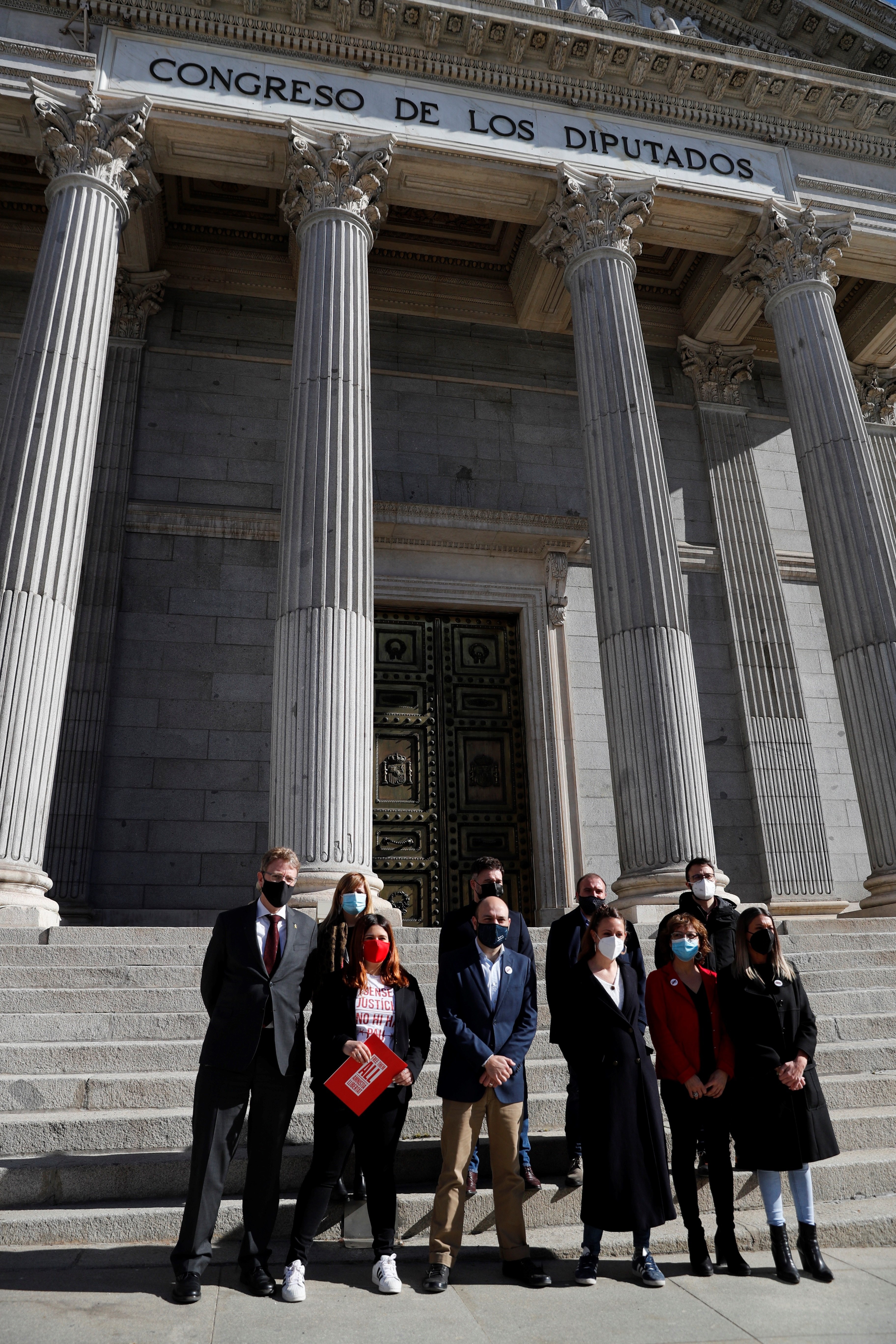The proposal for an amnesty law to move forward in resolving the Catalan conflict has been barred from even so much as a debate in Spain's Congress of Deputies. A week ago, accompanied by organizations such as Òmnium Cultural and the Amnistia i Llibertat group, the bill, aiming at freeing the political prisoners and halting the ongoing process of independence-movement prosecutions, was registered in Spain's lower house by ERC, Junts, PDeCAT and the CUP. This Tuesday, the Bureau of the Spanish Parliament did not even admit it for debate, according to parliamentary sources. The pincer action of Pedro Sánchez's governing PSOE, the main opposition party PP and the far-right Vox prevented it from moving forward, based on its alleged unconstitutionality. Unidas Podemos was once again alone in voting in favour of the bill having even the minimum parliamentary hearing. The four pro-independence parties have already announced that they will file a petition for reconsideration of the decision, although they have little faith that it will succeed.
The report of the parliamentary lawyers paved the way for the Socialists, who had already announced their opposition. Congress's legal services argued that “from a preliminary examination, it follows that the initiative, assuming the granting of a general pardon affecting a plurality of subjects convicted by a final sentence, would enter into a clear and obvious contradiction with article 62 of the Constitution". Article 62.1 of the Spanish Constitution establishes that it is up to the Spanish monarch "to exercise the right of pardon in accordance with the law, which may not authorize general pardons".
In fact, this is what the PSOE asserted when it argued for the rejection of the initiative before it was even registered in Congress. This took place last week, when party organizational secretary and government minister José Luis Ábalos reiterated his position "against the figure of amnesty", due to its generic nature. At most, there are "particular cases" which can be resolved legally, such as the possible pardons of the nine convicted independence leaders. And yet this route has also been frozen by the government, even though the initial excuse - the politically sensitive period of the Catalan election - has passed.
Rufián: "The Bureau, acting like a Constitutional Court"
The pro-independence parties were harshly critical of the decision. In the press room, ERC's Gabriel Rufián described it as "terrible news for democracy", warning that it is a "dangerous precedent that it cannot even be debated". The Catalan politician accused the PSOE, the PP and Vox of "turning the Bureau into a kind of mini-Constitutional Court", while allowing debate on "barbarisms" proposed by the right and the far right. Still, the Catalan groups will continue to fight. "They don't have enough lawyers or Vox deputies to stop it," said the ERC leader in Madrid.
Vehí: "Those who are corrupt can be pardoned"
In the same vein, the CUP's Mireia Vehí denounced the "prohibition of debate" on the amnesty law and regretted that the PSOE had aligned itself with the PP and Vox. She recalled not only Spain's 1977 amnesty at the end of the Franco regime, but also the three tax amnesties that have been taken place since, with the support of the Constitutional Court. "You can pardon corrupt people, and people who launder money, but not people who have put our ballots boxes," said the CUP deputy.
Nogueras: "The path of dialogue is a dead end"
For her part, Junts's Míriam Nogueras stated flatly that "there is no will to resolve the political conflict" from the Spanish government. The Junts spokesperson drew two conclusions: "There is a Spanish majority to exclude" and that "the path of dialogue is a dead end". That is why she called on the ERC - referring to them as partners of the Socialists in forming their government and passing a budget - to carry out an “exercise in honesty and stop believing that this path of dialogue is possible.” She denounced that Podemos is acting as an "accomplice" of the Socialists.
Inspired by the 1977 amnesty
The bill for an amnesty law registered by the Catalan pro-independence parties took as its reference not only the Spanish Amnesty Law of 1977, but also European experience, such as that of France in the process of decolonization of Algeria. The first article of the bill made clear its scope: “All acts with a political intentionality, whatever their outcome, which are classified as crimes or as conduct denoting administrative liability, carried out since 1st January, 2013, and until the entry into force of this law are granted an amnesty." And he delimited: "Any action linked to the democratic struggle for the self-determination of Catalonia will be understood as political intentionality." The bill focused on both the actions related to the first unofficial consultation of Catalan voters on independence (the 9-N vote on 9th November, 2014) as well as the independence referendum of 1st October, 2017.
The amnesty covered the crimes of rebellion and sedition, offences of public order, those of abuse of administrative power, falsification of documents, misuse of public funds, disobedience, disclosure of secrets, and “acts of expression and opinion” on different media and platforms. On the other hand, the police officers charged with offences in relation to the repressive actions on referendum day are not covered.

